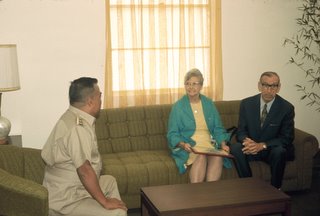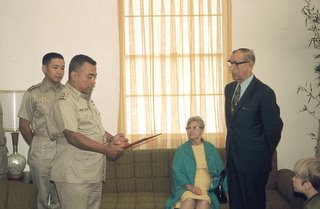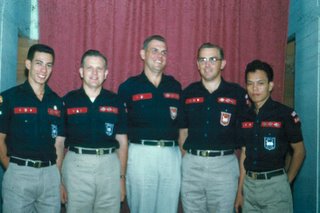Ken and Joyce Hardisty have served as missionaries in the Philippines since 1987. Serving in Baguio in the Central Luzon mountains, they have been involved with teaching and discipleship in several assemblies. They will be working as itinerant workers in the United States beginning in the Spring of 2015 and covet your prayers in this new season of ministry.
Saturday, February 25, 2006
Pray for Gospel Work in the Philippines
February 2005 Philippine photos found on this site, were taken by Patrick Carder of Walterick Publishing Ministries. Patrick's wife Karen was raised on the missionfield, and was in the same class in school with Joyce.
Call To Missions - Cyril Brooks
(a) There was complete dependence upon God the Holy Spirit, so that this book is often called “The Acts of the Holy Spirit.”
(b) There was a simple and natural development of the work, for God’s work is frequently depicted as a growth.
(c) Following evangelism, there was an emphasis upon establishing local churches so that believers could meet together for worship, fellowship and instruction.
(d) There was an absence of organization, board, or councils exercising authority over local churches.
(e) Three is little mention about financial support of workers and no record of the number of converts (except in round figures in two cases –2:41, 4:4).
In this study we will consider the Call to Missions. We are all familiar with the Great Commission given by Christ to His disciples. Its importance may be gauged by the fact that it is found in different words in each of the four Gospels and in the first chapter of Acts. His final words, His parting blessing before He ascended contained this: “But ye shall receive power, after that the Holy Spirit is come upon you: and ye shall be witnesses unto Me both in Jerusalem, and in all Judea, and in Samaria, and unto the uttermost part of the earth.”
At that time, as indeed through all the history of the Church, there seems to have been hesitancy in fulfilling that last phrase. It was not until there was persecution in Jerusalem that they went further afield (8:1, 11:19). Then some “traveled as far as . . . Antioch” and this led to the establishing of a church in Antioch which became the base for missionary expansion. No doubt God had a purpose in using Antioch as such a base rather than Jerusalem. This church was composed very largely of Gentile believers and the choice of Antioch would dispel any idea that Jerusalem was the “parent” or head church with authority over others.
Let us study this call from three aspects:
(a) The Call of the Holy Spirit;
(b) The Consent of the Local Church;
(c) The Consecration of the Missionaries.
In connection with the Call of the Spirit we note that it was His prerogative to call and it was by His power the workers were sent forth. While there are many different gifts or abilities given to the members of the body of Christ, yet in apportioning these gifts, the Holy Spirit is sovereign. He divides to every man “as He will” (I Cor. 12:11). Believers should earnestly desire the best gifts but the designation of these rests with the Holy Spirit. It was the Spirit who said: “Separate Me Barnabas and Saul.” There were not simply following their own inclinations, nor were they stirred by the emotional appeal of some other worker. It was not the church, nor the elders and teachers in that church who called them, but the Holy Spirit. We are not told just how the Spirit spoke to them. Did they hear a voice? Or see a vision? Or was it simply an inward conviction in their hearts concerning the will of the Spirit? The details are not revealed lest we should think it would have to be that particular way. The Spirit of God has different ways of making His will known. It is also important to note the words of verse 4: “So they, being sent forth by the Holy Spirit, departed . . .” As the Spirit of God had called them, so also He sent them forth on their mission. They were not sent by any organization; not even by the church in Antioch. A different word is used at the end of verse three to indicate the action of the church in letting them go. In the case the Tagalog Bible has a better translation than the English King James version.
The church at Antioch which thus gave its consent was in many ways rather a model church. They had been taught well by Barnabas and Saul (11:26) and had a variety of teachers (13:1). It was an active church as they ministered or served the Lord. Their fasting indicated their concern and exercise of heart so that they readily recognized the call for the Spirit. We wonder if they were fasting because they were burdened about the needs of those who had not hear the gospel! When they heard the call of the Spirit, they fasted and prayed, for it was not easy to give up their best men. For some time they had been edified by the teaching ministry of Barnabas and Saul. Their leaving would mean added responsibility for those left in Antioch. Yet even as they prayed, they could hardly have realized how important a move this was in the history of the Church, nor how far-reaching its outcome would be. When they laid hands on Barnabas and Saul, this was not in the sense of conferring on them any ability or authority. These two had already displayed their ability and authority as teachers in Antioch. The laying on of hands was an act of identification. Just as the Israelite of old identified himself with the animal sacrifice, sot he church in Antioch through their leaders indicated that the missionaries were going forth on their behalf to carry out a task which was common to all. So they commended them to the grace of God for the work of the Lord (14:26). It is worth noticing that this was done altogether apart from the apostles and church in Jerusalem.
Now let us briefly notice the consecration of the missionaries. This was not something official on the part of the church but rather the personal dedication of these workers. These men were promptly obedient to the Spirit’s call and devoted themselves completely to the work to which they had been called. They were men who had already proved their ability and thus were shown to be fit and ready for the call to a wider sphere of service for the Lord. No doubt it was not easy for them to give up the work they had been doing in Antioch nor to leave the happy fellowship with the brethren. However, the authority of the Holy Spirit was supreme, the call of God was unmistakably clear, so they set forth. Like Abraham of old—“By faith Abraham, when he was called . . . obeyed: and he went out, not knowing whither he went.”
How important to be sure of God’s call when setting for the in missionary work. Barnabas and Saul took a companion with them, the young man John Mark. It was not long before this young man returned home. Various reasons for this have been advanced. Was it because he was not fortified by the conviction that he had been called of God? A brother from the Southern states encountered a worker of whose call he had some doubts. Finally one day, in exasperation he said: “Brudder, was you sent or did you just went?” Barnabas and Saul were called by the Spirit but it looks as if Mark “just went.”
Monday, February 20, 2006
Friday, February 10, 2006
Rose Brooks - daughter of Cyril and Anna, and Joyce's Aunt












